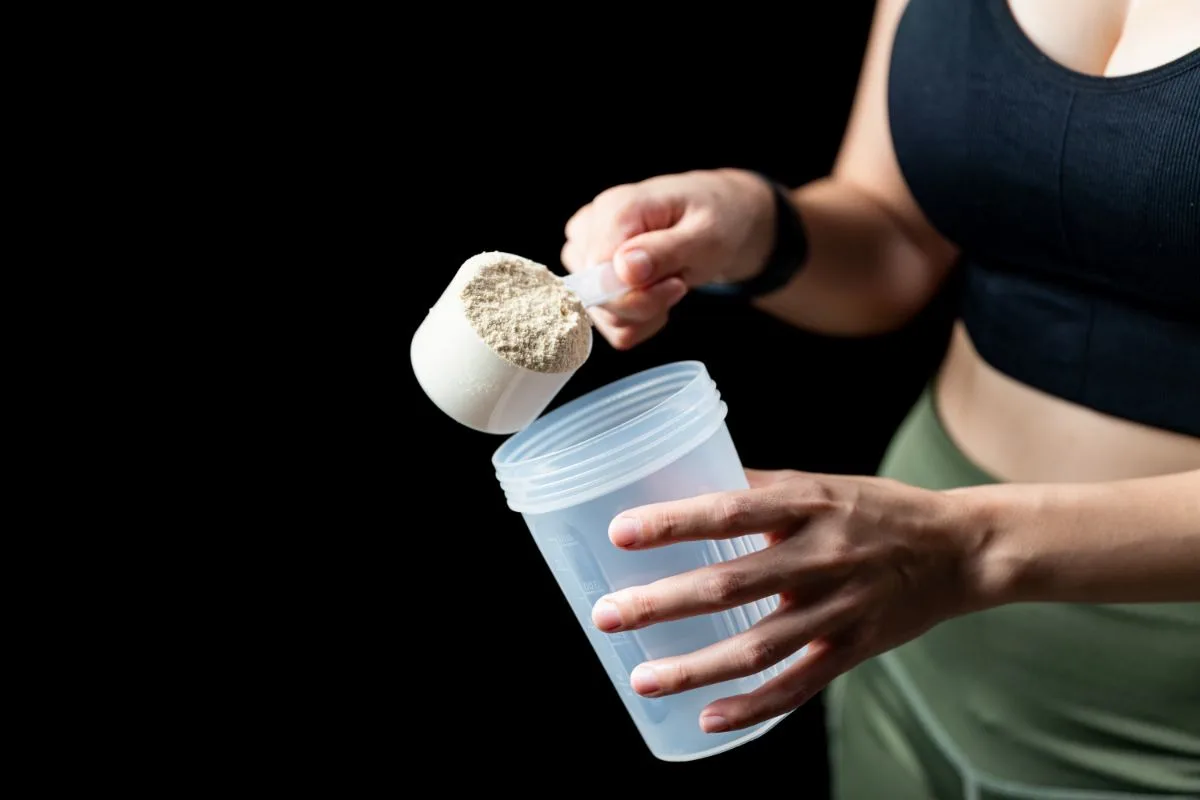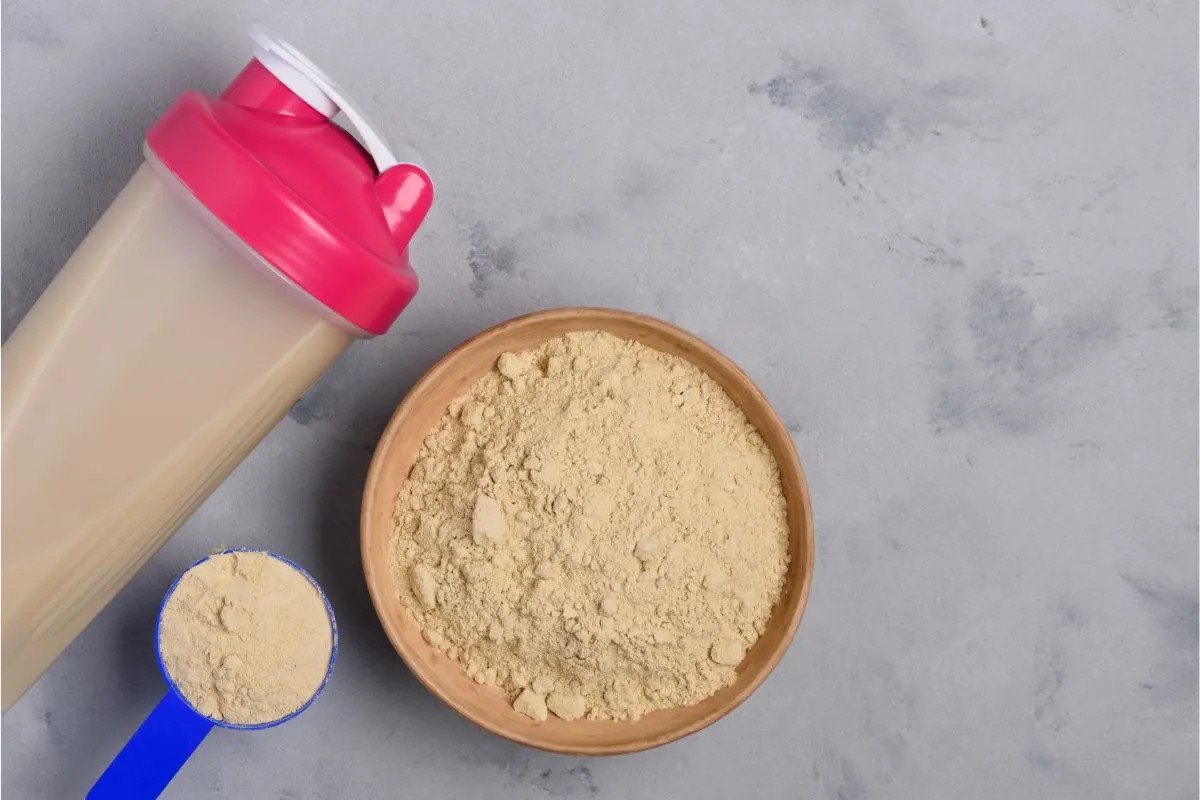If you did not know creatine is a substance which is completely organic and can be found within our body having been produced naturally.

95% of creatine can be found within skeletal muscle.
You can also find more creatine within a balanced healthy diet, for example, it can be found in some animal products, like seafood, red meat, and milk to name a few.
Trying to consume more creatine came into fashion after the Barcelona Olympic Games in 1992, and after this it started to be used a lot more commonly.
It has been shown to be quite an effective supplement to be used by athletes to get a physical advantage and to increase their performance.
In spite of this effectiveness, there has been very little study into just how effective or safe this substance is for use by adolescents.
Because of this, we have put this article together to evaluate just how useful this substance is for use by athletes in their younger years and see how well it can be used.
So, if you are a teenager who is looking to use creatine, but you are unsure whether this is a safe substance for you to use, keep reading!
Is Creatine Safe For Teens To Use?
For a quick answer it has been shown that creatine is not safe for adolescents or teens to use.
There is a statement from the American Academy of Pediatrics, and this stated that creatine is not recommended for use by adolescents, the main reason for this being the potential harm it could cause to the kidneys.
This is not the only side effect which could affect teens.
There can also be signs of stomach pains, muscle cramps, and even dehydration.
For an adult athlete, the use of creatine is both beneficial and safe, however, it is simply too impactful to the body to be useful for teen athletes.
Since their bodies are still developing, there could be serious health impacts which could last for the long term.
Using creatine as a supplement has been shown to be a popular method of getting an edge over the competition, and in spite of how it is not recommended for use by teens, there has been a study done which shows that it is used by 34.1% by children and by adolescents.
Because of how popular creatine is, and how it is not very healthy for use by teens, let’s look at how this supplement it used, and what the pros and cons of using creatine are.
What Are The Effects Of Creatine?
To put it simply creatine is classified as an amino acid, and this is used to aid your muscles in making energy for you to use while you are doing a more intense workout.
As was mentioned in the introduction, this creatine occurs within your body naturally, this is from within the muscle cells, and it will produce ATP (or adenosine triphosphate), which is one of the more basic forms of energy which can be produced by cells.
While you are doing physical exercise and physical activity, your levels of ATP will usually decrease.
This is why creatine is used as a supplement as it will essentially increase the stores of creatine which your body has to work with.
Usually this creatine is going to be stored in the form of phosphocreatine within your body, and this will then replenish your ATP.
This will end up with more stamina for you to work with giving you more energy while you are working out.
There have also been studies which show that creatine is thought to improve your strength and also increase your muscle mass, this means that it will help your muscles recover quicker while you are exercising.
This creatine is also used by athletes which are likely to be using their energy in shorter bursts, especially when this is an intense activity.
Examples of this include; weight training, weightlifting, athletics, sprinting, and bodybuilding
The Effects Of Creatine On Teenagers
As we have mentioned in the introduction, creatine is something which is found naturally in the body in the form of amino acids and you can find this in a well balanced diet.
Supplementing creatine is perfectly healthy for adults, and doing this has been shown to be both safe and beneficial.
This leads teens to think that creatine is just as useful for them, and because of this, not too much research has been done into this.
If you want to evaluate exactly why creatine is still used by teens, but why it is not recommended, we have listed the strengths and weaknesses of teens using creatine.
Benefits Of Creatine Being Used By Teen Athletes
It is likely that teens are put under a lot of pressure to perform as well as they can, and this is why so many use supplements to improve this performance and give themselves more strength and stamina.

While there are definite drawbacks to creatine use by teens, there are also some strengths which are worth considering.
Creatine Increasing Muscle Mass For Teen Athletes
Even though creatine is not designed to be used by teens, it will still have the intended effect of increasing body weight as well as the chances of gaining muscle mass.
Part of what creatine supplementation does is drawing water into your muscles, and this will increase water retention.
You can also naturally increase your creatine concentration through consistent workouts, and this will lead to more lean muscle mass.
Creatine Improving Performance And Muscle Strength
Creatine has been shown to optimize your physical performance while exercising, and this is done by promoting your endurance and your strength during an athletic performance.
This is why studies have been done that prove that using creatine will increase your peak muscle output, even in those under the age of 18.
It has been displayed that teens who use creatine consider the increase in strength one of the best benefits of using creatine.
This is why you will still find some sporting organizations promoting the use of creatine, even for teens.
Creatine Promoting Post Workout Recovery
Just like adult athletes, it is likely that teen athletes will be engaging in more intense training styles and routines.
Because of this, there is often an increase in recovery time which can be difficult to deal with, so using products like creatine has been shown to help with this.
Supplementing creatine has been shown to help with injury prevention, as well as aiding against muscle soreness.
Creatine Promoting Specific Pediatric Disorders
It has been shown that creatine also has potential to help aid with traumatic brain injuries as well as with muscular dystrophy as well.
There have been specific studies into these more niche issues and it has been shown that creatine use could actually help teenagers with protecting their brain health if they run into a concussion.
Creatine has also been shown to help lower the symptoms which are commonly associated with trauma.
The Dangers Of Creatine Being Used By Teen Athletes
As we mentioned earlier, use of creatine by teens has been recommended against by the American Academy of Pediatrics as well as the American College of Sports Medicine.
In general both of these bodies have recommended against use of performance enhancing supplements by teen athletes.
In spite of this, because of creatine benefits from safe use by adults, many have assumed it will have the same effects on adolescents.
It for example increases the physical as well as the anaerobic performance of athletes.
But unfortunately, there has not been much study on what the long term effects of using creatine have on teens.
One of the most common side effects of using too many supplements is that the kidneys will end up working too hard, and this can very quickly lead to the kidneys getting damaged, and this can lead to many other health concerns.
There are other side effects which have been reported as side effects of using too much creatine, with some of the most common being stomach pains and weight gain.
These negative symptoms have been shown to get even worse when it comes to having higher doses of creatine.
Just to list a few of the most common effects of using creatine, they include; water retention, weight gain due to this water retention, muscle cramping, diarrhea, problems with the kidneys, problems with the liver, seizures, nausea, and dehydration.
It is also worth noting that there is not as much regulation as there should be when it comes to the production and manufacture of supplements like creatine, especially if you want to consider its use by teens.
If you are an adult using creatine, we heavily recommend using a supplier with a positive reputation and plenty of positive reviews and feedback.
There have even been studies which show that creatine contains some heavy metals which contaminate what should be an organic substance.
For a brand of creatine to be trusted, you will want them to have an NSF certification which will guarantee that the brand as well as the product have both been tested by a third party to be free of any contaminants or banned substances.
For a creatine supplement to be high quality it will need to fulfill some specific criteria, this includes:
- The appearance being a white or pale cream color
- The assay should have at least 95% via HPCE or HPLC
- The moisture content should not be any higher than 12.5%
- The content of the supplement will need to test negative for containing; salmonella, E coli, and S aureus
- There should be less than 50 per gram of yeasts or molds
- There will need to be less than 10ppm for heavy metals or potential poisons
- There will need to be less than 3ppm for any potential contaminants like arsenic, or less than 30ppm for dicyandiamide.
How To Use Creatine

There are 2 main methods of supplementing while using creatine, we will go into each method here.
Creatine Loading
The definition of creatine loading will be taking about 5 grams of creatine at 4 different times throughout the day over the course of around a week which will total at 20 grams daily.
The theory behind this method of taking creatine is that you will be filling your muscle cells with creatine which will lead to faster results.
Low Dose Daily Supplementation
This method means you will be taking about 3 to 5 grams every day instead of using a loading phase.
After doing this for around 3 weeks you will find that your muscles will have around the same amount of creatine saturated into your cells than you would through creatine loading.
Maintenance Protocol
There is a maintenance phase after you have done creatine loading and this is taking 3 to 5 grams of creatine daily.
This is done with the goals of maintaining the levels of creatine which are in the muscle cells.
Creatine Supplementation Tips
When you are taking creatine, you will want to do this with 8 ounces or 240 milliliters of water, or a similar drink.
Since dehydration is a potential effect of creatine, you will want to ensure that you are staying hydrated when supplementing using creatine.
This is because creatine is drawing water into your muscle cells.
You will want to be drinking about a gallon or 4 to 5 liters of water a day when you are supplementing with creatine.
If you have found that you are experiencing painful stomach distress, or bloating when you are creatine loading, you will want to slow down how much you are taking, and switch to a more low dose method of supplementation instead.
How Much Creatine Should You Take
You will want to be taking between 3 or 5 grams of creatine monohydrate every day, and if you are building muscle through creatine loading, you will want to be taking around 20 grams of creatine every day between 5 and 7 days and then the maintenance period of 3 to 5 grams daily after this.
If you are taking too much at once you will be wasting your money and will likely experience pain.
How Much Is 5g Of Creatine
You will get 5 grams of creatine in a 1.4 teaspoons, or most people will just do a heaped teaspoon.
If you do not have a measure scoop with your creatine, then using a kitchen measurement teaspoon is a good substitute.
Getting exactly 5 grams is not the easiest task, this is why we recommend getting a good kitchen scale if you want to stay as accurate as possible
How Long Does It Take For Creatine To Work
You should find that your creatine will be working in less than a week if you are creatine loading.
If you are on a low dose supplementation, then you will feel the results a bit more slowly with 3 to 4 weeks being more expected.
How Long Will Creatine Last
After you finish using creatine, you will find that about 46% of your creatine which you have ingested being gone after 24 hours.
After this the levels of creatine in your muscle tissue will start to drop over the course of 4 weeks and then your energy levels will return to where they were before.
How Long Should You Be Taking Creatine
There have been clinical studies, and these show that it is safe to take up to 30 grams of creatine daily every day for 5 years, but this is really pushing your body to the limit without any side effects, and is not recommended for most forms of creatine loading.

This is also definitely recommended for teens.
Frequently Asked Questions For Using Creatine As A Teen
How Old Do You Have To Be To Buy Creatine?
In spite of the potential negative effects creatine can have on teens, you can actually purchase the supplement at any age and you will not need the consent of a guardian or parent.
Because creatine is a supplement, it is also not regulated by the FDA, which is why some people have questions about the purity of the ingredients which are used in it, and the claims made on the packaging.
Do you Need An ID To Buy Creatine?
Since there are no age restrictions on buying creatine, you will not need to have any ID to buy this supplement from health stores, or supplement stores.
However, there are some larger stores like Walmart which will occasionally require you have ID to buy creatine, this is done in an attempt to avoid any lawsuits.
Is Creatine Legal For High School Athletes?
This is a controversial issue as it is legal or athletes at a high school level to use creatine, in spite of the issues which it could lead to, and potentially making the playing field uneven.
There are some people who want the supplement to be made illegal at a high school level since it can have long term health issues attached to it, and this should not be encouraged for teens of any age.
It is occasionally discouraged, but never outright banned.
People often recommend whey protein as a better alternative which is more likely to be safe.
Can Creatine Stunt Growth?
It has not been proven that creatine is related to stunted growth, and in fact, the opposite is more likely to be true since creatine plays a part in repairing and strengthening your muscles.
Does Creatine Cause Acne?
There is no direct link between creatine and acne.
However, it has been seen that teenagers who are more prone to acne, are likely to face more breakouts while they are taking creatine.
This is likely because creatine leads to them working out for longer, which will then increase the sweat and the oil levels and this will likely lead to an acne breakout.
Can Creatine Make You Angry?
It has not been proven that creatine makes you angry and it has not been linked to anger problems, mood swings, or any form of increase in aggression.
It has been shown to have no link to testosterone levels, so this is why it does not affect the mood.
Does Creatine Cause Anxiety?
There have been some links made between creatine use and anxiety, with one study showing that using creatine daily can actually have a positive influence on the mood, and this has led to creatine being in development to be linked to anxiety medication, and even being used on PTSD patients for improving quality of sleep (see also “What Are The Benefits Of Taking Your Teenagers Phone Away Before Sleep“).
Does Creatine Cause Brain Damage?
It has not been proven that creatine has any link to brain damage, and instead it can do the opposite and will reduce any structural damage done to brain cells and can help protect your brain from injuries due to a lack of oxygen as it prevents the chance of ATP depletion.
Why Do I Feel Funny After Taking Creatine?
There are many reasons you could be feeling unwell after taking creatine, whether this is taking too much, mixing it with sugars and then having too much sugar, not drinking enough water which is then leading to dehydration, mixing with medications, you could be having an electrolyte imbalance as well.
There are many reasons you could be feeling bad, so working out what the factors around feeling unwell are will help you work out what the cause is.
Summary
Hopefully this article has given you all the information you need about creatine and its use by teens.
As this article has displayed, there are plenty of benefits to using creatine, but a lot of these will be offset if you are taking it as a teenager.
It is strongly recommended to avoid doing this as the long term side effects are not worth the potential for permanent damage.
If you really want to take a supplement, using whey protein is much more likely to be better for you and not cause as much harm.
- Homeschooling In High School: Pros And Cons - February 24, 2024
- How Do I Withdraw My Child From School To Homeschool? - February 23, 2024
- How To Not Go Crazy Homeschooling Kids: A Guide For Frazzled Parents - February 22, 2024








